BMW iX1 vs Toyota Corolla Cross - Differences and prices compared
Compare performance (313 HP vs 180 HP), boot space and price (41800 £ vs 31700 £) at a glance. Find out which car is the better choice for you – BMW iX1 or Toyota Corolla Cross?
Costs and Efficiency:
When it comes to price and running costs, the biggest differences usually appear. This is often where you see which car fits your budget better in the long run.
Toyota Corolla Cross has a noticeable advantage in terms of price – it starts at 31700 £, while the BMW iX1 costs 41800 £. That’s a price difference of around 10123 £.
Engine and Performance:
Power, torque and acceleration say a lot about how a car feels on the road. This is where you see which model delivers more driving dynamics.
When it comes to engine power, the BMW iX1 has a decisively edge – offering 313 HP compared to 180 HP. That’s roughly 133 HP more horsepower.
In acceleration from 0 to 100 km/h, the BMW iX1 is clearly perceptible quicker – completing the sprint in 5.60 s, while the Toyota Corolla Cross takes 7.60 s. That’s about 2 s faster.
There’s no difference in top speed – both reach 180 km/h.
Space and Everyday Use:
Beyond pure performance, interior space and usability matter most in daily life. This is where you see which car is more practical and versatile.
Both vehicles offer seating for 5 people.
In curb weight, Toyota Corolla Cross is decisively lighter – 1380 kg compared to 1940 kg. The difference is around 560 kg.
In terms of boot space, the BMW iX1 offers somewhat more room – 490 L compared to 425 L. That’s a difference of about 65 L.
In maximum load capacity, the BMW iX1 performs somewhat better – up to 1495 L, which is about 158 L more than the Toyota Corolla Cross.
When it comes to payload, Toyota Corolla Cross to a small extent takes the win – 560 kg compared to 495 kg. That’s a difference of about 65 kg.
Who wins the race?
The BMW iX1 proves to be leaves the rival little chance and therefore becomes our DriveDuel Champion!
BMW iX1 is the better all-rounder in this comparison.
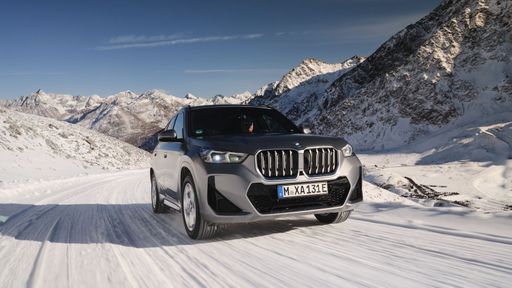
BMW iX1
Costs and Consumption
View detailed analysis
Engine and Performance
View detailed analysis
Dimensions and Body
View detailed analysis
BMW iX1
The BMW iX1 wraps BMW's electric ambition into a compact SUV package that feels unexpectedly premium, with sharp handling and a crisp, modern cabin that keeps the driver in charge. It's ideal for buyers who want a stylish, quiet daily driver with useful practicality and tech-savvy touches — plus enough character to make the commute feel less like a chore and more like a short joyride.
details
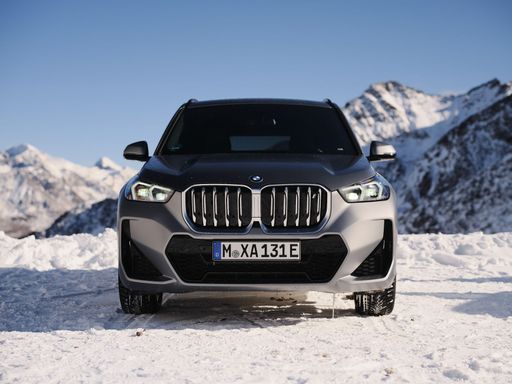
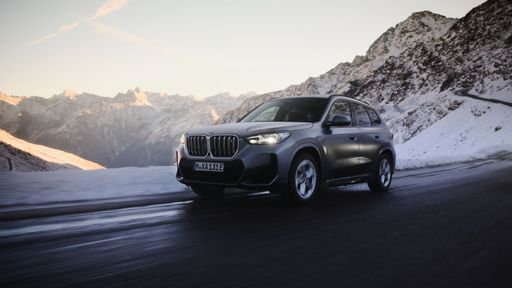
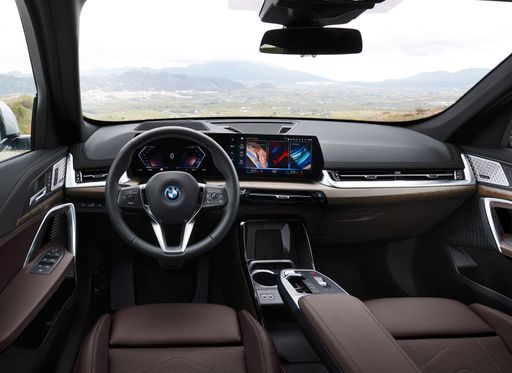
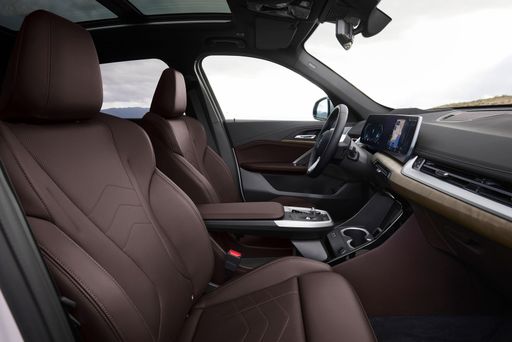
Toyota Corolla Cross
The Toyota Corolla Cross takes the familiar Corolla recipe, lifts it up and dresses it in SUV clothes — sensible, comfortable and blessedly unflashy. It won’t thrill the enthusiast, but its easy manners, clever packaging and dependable feel make it an ideal everyday car for shoppers who prefer sense over sass.
details
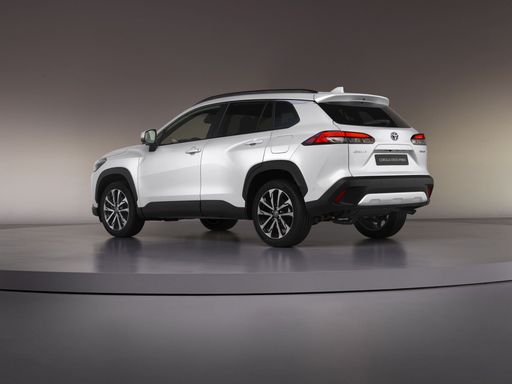
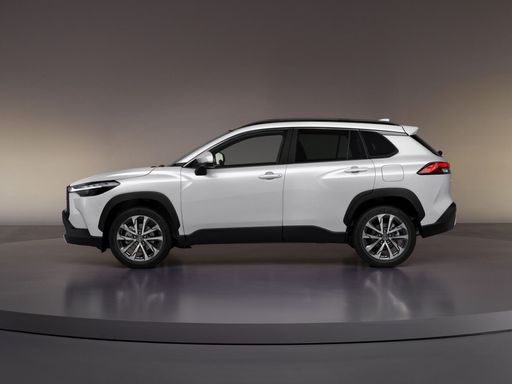

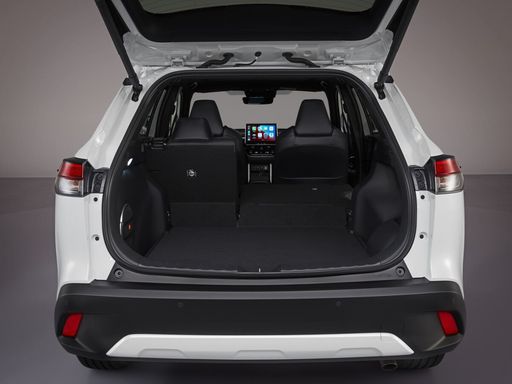

|

|
|
|
|
Costs and Consumption |
|
|---|---|
|
Price
41800 - 54600 £
|
Price
31700 - 41900 £
|
|
Consumption L/100km
-
|
Consumption L/100km
4.9 - 5.3 L
|
|
Consumption kWh/100km
15.8 - 17.1 kWh
|
Consumption kWh/100km
-
|
|
Electric Range
436 - 463 km
|
Electric Range
-
|
|
Battery Capacity
64.80 kWh
|
Battery Capacity
-
|
|
co2
0 g/km
|
co2
112 - 120 g/km
|
|
Fuel tank capacity
-
|
Fuel tank capacity
36 - 43 L
|
Dimensions and Body |
|
|---|---|
|
Body Type
SUV
|
Body Type
SUV
|
|
Seats
5
|
Seats
5
|
|
Doors
5
|
Doors
5
|
|
Curb weight
1940 - 2085 kg
|
Curb weight
1380 - 1500 kg
|
|
Trunk capacity
490 L
|
Trunk capacity
414 - 425 L
|
|
Length
4500 mm
|
Length
4460 mm
|
|
Width
1845 mm
|
Width
1825 mm
|
|
Height
1616 mm
|
Height
1620 mm
|
|
Max trunk capacity
1495 L
|
Max trunk capacity
1333 - 1337 L
|
|
Payload
495 kg
|
Payload
515 - 560 kg
|
Engine and Performance |
|
|---|---|
|
Engine Type
Electric
|
Engine Type
Full Hybrid
|
|
Transmission
Automatic
|
Transmission
Automatic
|
|
Transmission Detail
Reduction Gearbox
|
Transmission Detail
CVT
|
|
Drive Type
Front-Wheel Drive, All-Wheel Drive
|
Drive Type
Front-Wheel Drive, All-Wheel Drive
|
|
Power HP
204 - 313 HP
|
Power HP
140 - 180 HP
|
|
Acceleration 0-100km/h
5.6 - 8.6 s
|
Acceleration 0-100km/h
7.6 - 10 s
|
|
Max Speed
170 - 180 km/h
|
Max Speed
170 - 180 km/h
|
|
Torque
250 - 494 Nm
|
Torque
-
|
|
Number of Cylinders
-
|
Number of Cylinders
4
|
|
Power kW
150 - 230 kW
|
Power kW
103 - 132 kW
|
|
Engine capacity
-
|
Engine capacity
1798 - 1987 cm3
|
General |
|
|---|---|
|
Model Year
2022 - 2023
|
Model Year
2025
|
|
CO2 Efficiency Class
A
|
CO2 Efficiency Class
C, D
|
|
Brand
BMW
|
Brand
Toyota
|
Is the BMW iX1 offered with different drivetrains?
The BMW iX1 is available as Front-Wheel Drive or All-Wheel Drive.
The prices and data displayed are estimates based on German list prices and may vary by country. This information is not legally binding.
